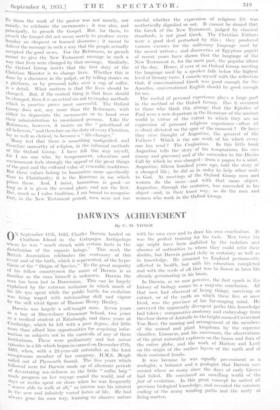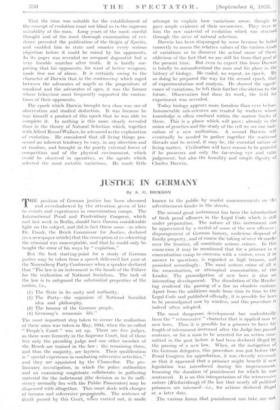DARWIN'S ACHIEVEMENT
By C. M. )(ONCE IAN September 17th, 1835, Charles Darwin landed on 14-Yr -Chatham Island in the Galapagos Archipelago where he was " much struck with certain facts in the distribution of the organic beings." This week the British Association celebrates the centenary of this "event and of the birth, which it represented, of the hypo- thesis' of the " Origin of Species." To the great majority of his fellow countrymen the name of Darwin is • as familiar as the man himself is unknown. Darwin the man has been lost in Darwinism. This can be largely explained by the • extreme seclusion in which much of his life was spent while the public battle for evolution was • being waged with outstanding skill and vigour by"the• still vivid figure of Thomas Henry Huxley.
• Darwin was largely a self-taught man. Seven years as a boy at Shrewsbury Grammar School, two years • .11..,s .4 'medical student at 'Edinburgh, and three years 'at Cambridge, which he left With a pass degree, did little • More than afford 'him opportunities for acquiring infor- !nation on subjects not in the curricula of any of these Institutions. These were preliminary and but minor episodes in a life which began in earnest on December 27th, 1881, when, with a 22-year-old naturalist as the 'least Conspicuous Member of her company, H.M.S. Beagle sailed' out of Plymouth Sound. The five years 'Which followed were for Darwin made up of •alternate periods Of devastating sea-sickness as the little • " coffin brig " made progress on her voyage round the world; and of days or weeks spent on shore when he was frequently scarce able to walk at all," so-intense was his interest in the new and infinitely varied forms of life.• 'He.had always gone • his own way, learning Ad, observe nature with his own eves and to draw his own conclusions. 'It was the perfect training for his task. Men twice hit age might have been stultified by the isolation and absence of authorities to whom they could refer their doubts, but Darwin gained daily in certainty as well as in knowledge. He returned to England permanently affected in health, but with his education completed and with the seeds of all that was to flower in later life already germinating in his brain. In Darwin, as we now perceive, the first epoch in the history of biology comes 'to a majestic conclusion. All than men had observed of living things, surviving or extinct, or of the earth on which these live or once lived, was the province of his far-ranging mind. He surveyed the apparently divergent paths this knowledge had taken ; comparative anatomy and embryology from the clear dawn of Aristotle to the bright noon of Cuvier and Von Baer, the naming' and arrangement of the members of the animal and plant kingdoms by the' supreme classifier, Linnaeus, and his successors, the observations of the great naturalist explorers on the fauna and flora of the entire globe, and the work of Hutton and Lyell on the origin of the surface layers of the earth and of 'their' contained fossils. - • It Was because he was equally pre-eminent as a zoologist, a botanist' and a geologist that Darwin suc- ceeded where so many since the days Of early Greece had 'failed. He convinced an unwilling world of the fact of evolution. In this great concept he united all 'previous biological knowledge, and revealed the common ending of the 'many winding paths and the unity of 'living .matter.• • That the time was -suitable for the • establishment of the concept of evolution must not blind us to the supreme suitability of the man: Long years of the most careful thought and of the most thorough examination of evi- dence preceded . the publication of the Origin of Species, and enabled him to state and counter every serious objection before it could be. raised by his opponents. In its pages Was revealed 'no arrogant dogmatist but a very humble searcher after truth. It is hardly sur- prising that his opponents, for want of better weapons, made free use of abuse. It is certainly owing to the character of Darwin that in the controversy which raged between the advocates of angels as the progenitors of mankind and the advocates of apes, it was the former whose behaviour most frequently supported the conten- tions of their opponents.
The epoch which Darwin brought to a close was one of observation and studied deduction. It was because he was himself a product of this epoch that he was able to complete it. In nothing is this more clearly revealed than in the theory of Natural Selection which, together with Alfred Russel Wallace, he advanced as the explanation of evolution. He considered that all living things pos- sessed an inherent tendency to vary, in any direction and at random, and brought in the purely external forces of competition and of the physical environment, which could be observed in operation, as the agents which selected the most suitable variations. He made little attempt to explain how variations arose, though he gave ample evidence of their occurrence. They were. to him the raw material of evolution which was strained through the sieve of natural selection. Darwin has been disparaged by sonic because he failed correctly to assess the. relative values of the various kirals of variations or to discover the actual cause of these, oblivious of the fact that we are still far from that goal at the present time. But even to expect this from Darwin is totally to misunderstand the.man and his place.in the history of biology, He ended, we repeat,. an epoch. . 13)7 so doing he prepared the way for the second epoch, that of experimentation and analysis. He showed the signifi-'. cance of variations, he left their further elucidation to thc future. Observation had done its work, the field fur experiment was revealed.
Today biology appears more formless than ever before. Innumerable sub-sciences are-tended by workers who" knowledge is often confined within the narrow 1 i 11 i i I s or these. This is a phase which will pass ; already in the • union, of genetics and the study of the cell we see one ira of a new unification. A second Darwin will eventually be needed to gather together the scattered • threads and to reveal, it may be, the essential nature or living matter. Civilisation will have reason to be grateful if he possesses not only the far-seeing eye and cairn judgement, but also the humility and simple dignity cf Charles Darwin.







































 Previous page
Previous page